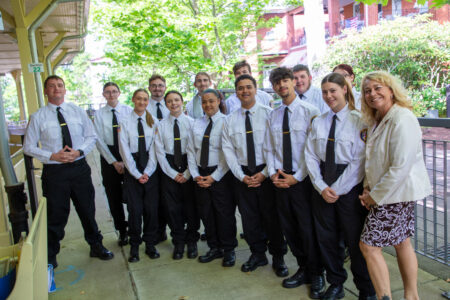Growing Reputation
Humanist Speaks At Chautauqua Institution

Roy Speckhardt, American Humanist Association executive director, spoke in conversation with Bishop Gene Robinson, senior pastor and vice president of religion at Chautauqua. The duo discussed how humanists, at least from Speckhardt’s perspective, deal with world issues. P-J photo Jordan W. Patterson
CHAUTAUQUA – Roy Speckhardt was initially confused why he was invited to speak at Chautauqua Institution as part of its interfaith lecture series because he is simply not a man of faith, at least not in the traditional sense.
“Well when I reviewed the description of the interfaith lecture, I have to admit, I was a little surprised that I was invited,” Speckhardt said to the crowd gathered in the Hall of Philosophy last week. “After all, I’m someone who doesn’t identify with faith.”
Speckhardt, who identifies as a humanist and is not a person of faith, jokingly introduced himself to the interfaith lecture audience Friday.
Americanhumanist.org defines humanism as a progressive philosophy of life that, without theism or other supernatural beliefs, affirms our ability and responsibility to lead ethical lives of personal fulfillment that aspire to the greater good.
Speckhardt is the executive director of the American Humanist Association. There, he promotes his humanist point of view regarding political issues.
He has appeared on Good Morning America, CNN, Fox News and NPR. He also contributed a regular column for The Huffington Post.
Speckhardt graduated from George Mason University earning his MBA.
Speckhardt is the author of “Creating Change Through Humanism,” which is available through the Humanist Press.
He also gives lectures at colleges, conferences and local humanist groups about the teachings of the humanist perspective and how it can serve the world.
The lecture was led by Bishop Gene Robinson, senior pastor and vice president of religion at Chautauqua. Robinson asked, as he does with all interfaith lecture speakers, about how people who follow the humanist perspective deal with ongoing world issues. Those issues include suffering and the question of how to deal with evil throughout the world.
“We’re posing a religious question, a theological question, and we’re asking them to address it from their faith perspective,” Robinson said of the series.
Primarily, the speakers are asked to detail how their faith or perspective handles evil, suffering, violence and tragedy.
Additionally, Speckhardt explained how humanists, while not necessarily religious, promote compassion to make the world a better place.
Speckhardt’s lecture was one of nine speakers in the interfaith lecture series for Chautauqua’s 2019 season.
Speckhardt said he is a member of a growing population that includes people who identify as humanists, atheists and with secular viewpoints. Regardless, he told the interfaith audience that he was honored to be there.
Despite telling the crowd he does not believe in a deity or an all powerful force, he attempted to answer the question of why evil exists and why would God allow people to suffer.
But for Speckhardt, he said because of his belief that there are no “all-powerful” forces, he does not believe there is one deity or force of evil allowing suffering to happen. But despite his lack of faith or belief in a deity, his perspective of humanism still promotes compassion and altruistic behavior, he said.
Much like the title of his book, “Creating Change Through Humanism,” he believes positive change can be made without religion and good can be promoted without believing in God.






